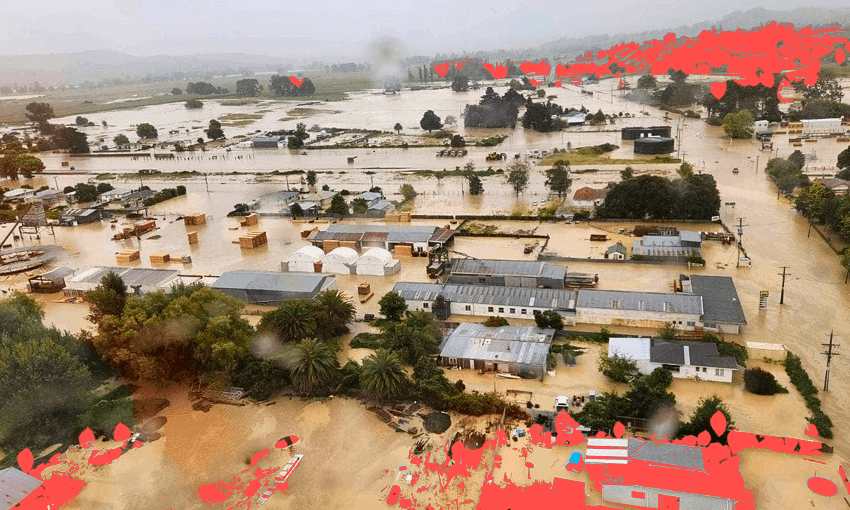New Zealanders donated tens of millions towards the Cyclone Gabrielle relief effort, but most of that money has since sat idle – leaving many victims saying they feel forgotten.
New Zealand community Facebook pages are typically mundane. People post about lost cats, local events and try to unload unwanted items. Yet on one page, Cyclone Hawke’s Bay Help, the conversation is heartbreakingly different. On the page, people are still seeking shelter, food and clean-up aid from their neighbours, more than two months after Gabrielle ravaged their homes. Others are trying to reconnect lost taonga, like photo albums, to their owners or offering free cots, clothes and cooking. Hawke’s Bay local Neela Neela coordinates up to 1,000 free meals for flood victims and clean up volunteers every day.
The depressing reality is that many of the worst-hit victims of Cyclone Gabrielle are still short on bare necessities, and their properties range from partially destroyed to completely unliveable. News cycles have moved on, and attention has been diverted, but residents in the hardest-hit areas – Gisborne, Hawke’s Bay and Auckland’s west coast – will tell you they’re still literally picking up the pieces. On the Hawke’s Bay page, one Wairoa local said, “We still need help even though the media says otherwise, ask a person from Wairoa!”
Pleading for help with all manner of manual labour and clean-up jobs on the cyclone help page is still a daily occurrence for many Hawke’s Bay residents. At the same time, people offer aid in a non-official capacity, many equipped with heavy machinery and some travelling from as far as the South Island. Locals have even banded together to form clean-up, cooking and laundry task forces.
Chloe Johnson is the admin of Cyclone Hawke’s Bay Help, one of the many locals volunteering their time and energy for free to help the community. On the page, Johnson called out the slow official cyclone response in late March. “Money, funding, donations – where is it all and why are we still shovelling silt one spade at a time when there’s millions of donations sitting in several charitable trusts and entities?” Johnson is referring to funds run by organisations like Red Cross New Zealand and the Lotto NZ fundraiser.
The post’s hundreds of comments largely agreed that the recovery efforts have been too slow. Some comments called out the relief funds as scams run by thieves, and another asked how to apply for funding after losing everything to silt and slash. A former Red Cross staffer commented, “I would never give them a cent in donations to help out during emergencies. Instead, give to people who you can see are doing the hard mahi, local communities/families, not the big ‘charities’.” So who has been administering the recovery efforts, what have they done so far, and why are they getting so much flack from victims and donors alike?
The recovery and relief efforts
The response to the destruction wrought by Cyclone Gabrielle is primarily playing out on three levels: local government, national government and non-governmental organisations (NGOs). At a local government level, councils allocate money primarily to households and community groups; for example, the several million dollars that the Hawke’s Bay Regional Council has already given out. The government also offered support, like the defence force’s immediate response in February or funding schemes like Work and Income’s civil defence payments.
Some of the government’s relief money, a total of $11.77 million, was raised via a special Lotto draw. When The Spinoff asked Lotto NZ when it wanted the money raised to reach the victims, a spokesperson said there was no specific timeline. Johnson said this wasn’t good enough. “They should have had a plan around how the funds will be distributed, to whom and when before the Lotto fundraiser was even announced,” she told The Spinoff. “To still have no idea weeks later is insulting to people who are crying out for immediate needs.”
Much of the heavy lifting has been left to NGOs – namely Red Cross New Zealand. At last count, the Red Cross appeal had collected $19 million in donations, with Stuff and NZ Herald both running nationwide campaigns. Red Cross is officially updating that tally on Thursday April 20 and it’s expected the figure will grow. Yet only $3.18 million had been allocated by April 12, nearly two months after Gabrielle struck. Johnson said New Zealanders donated money to the Red Cross appeal in good faith, expecting that their money would quickly go towards aiding victims, but Red Cross has said its cyclone response timeline will cover the next 12 months, with an emphasis on the first six. Johnson said she was heartbroken by that slow timeline, saying “it’s not even too slow; it’s just not acceptable”, adding that from her on-the-ground experience, the people whose lives, livelihoods and businesses were destroyed couldn’t wait 12 months.
Why, though, is Red Cross’s timeline so prolonged? Shane Chisholm, Red Cross’s general manager for enterprise and engagement, said the charity wanted to respect the differing local and regional circumstances of Cyclone Gabrielle’s devastation and analyse the needs of the different victim communities, so it could have the “most impactful response with the resources we have available”. Johnson said she wasn’t trying to discredit the good mahi that Red Cross had done, citing the charity’s $1.1m investment into yellow-stickered households in Wairoa in late March and the recent establishment of direct applications to the Red Cross relief fund for local organisations. Those grants range from $5,000 to over $50,000. Most importantly, on April 11 Red Cross allocated $1 million directly to Hawke’s Bay.
Too little, too late?
But the criticism from Hawke’s Bay volunteers has been about timeliness. Johnson said opening applications was “a positive move, but it’s still far too late”, with decisions not due until May at the earliest. Since the response has taken so long, Johnson said the relief efforts missed the mark of helping in the immediate aftermath and instead were focusing only on the long term. She was also sceptical of the capability of community organisations to support the victims who needed aid, worrying that some households would fall through the gaps. If a colossal organisation like Red Cross struggled to help victims promptly, how would small entities with fewer resources succeed where a multinational charity failed?
The Cyclone Gabrielle recovery efforts are not the first time questions have been raised over a Red Cross appeal taking too long to help victims. During the 2020 Australian bushfires, the charity was criticised for its slow response. It emerged Red Cross Australia was taking up to $11m for administrative costs, which at the time equated to around 10% of the total fundraised money, and was labelled a “mounting public relations crisis“.
Ultimately, Red Cross Australia did allocate 96% of the total bushfire fund to victim communities – it just took a while. Chisholm said the New Zealand charity was eager to avoid repeating some of the mistakes its Australian counterpart had made, assuring The Spinoff that none of Red Cross’s Cyclone Gabrielle relief funds would go towards administrative costs because of their “special appeal” status, meaning all of those internal expenses would be funded from the charity’s pre-existing coffers.
Nonetheless, Johnson said the Hawke’s Bay volunteers, who are still coordinating toxic silt removals, have felt forgotten and dehumanised by the government and NGO response. In a written statement, cyclone recovery minister Grant Robertson told The Spinoff the Beehive’s cyclone policy preference was a locally-led recovery. But there has been a lack of communication between Beehive officials and local volunteers, so much so that the Hawke’s Bay group only learned about the Robertson-led cyclone taskforce a month after its founding.
What’s in store for the future?
Robertson said the government agreed with the elongated Red Cross timeline, saying, “we are only in the early stages of the recovery so there is plenty more to come”. Both Red Cross and Robertson cited the need to work with local communities as one reason for this. “We believe local people know their own needs and are best placed to deliver the response, supported by central government,” said Robertson.
After two months of waiting, Hawke’s Bay is finally receiving some of the $19m New Zealanders raised for the cyclone recovery, with Red Cross’s $1m donation to Hawke’s Bay being administered by the region’s political leaders. “Without the support of Red Cross and other generous donors, we would not be able to provide vital assistance to help people get back on their feet,” said Hawke’s Bay disaster relief fund and regional council chair Hinewai Ormsby. Red Cross’s contribution adds to the existing investments already allocated to 3,263 victims by local leaders, with individuals, families and community groups set to be the beneficiaries of the $1m grant for expenses not covered by insurance or other relief schemes. One of the aims of the direct applications to Red Cross’s disaster relief fund is to help groups doing clean-up mahi.
On the Red Cross website it says “donations from people like you are what ensure we are always prepared to give people the help they need in emergencies, like during these severe weather events.” By definition, an emergency requires immediate action. “A lot of these charities or organisations talk about making sure the funds go to the ‘immediate needs’,” said Johnson. “Well, that ship has sailed as the immediate need for destroyed homes, orchards and businesses was eight weeks ago.” Does that mean Red Cross has already failed to achieve one of its self-imposed Cyclone Gabrielle recovery metrics?
No matter the answer, Hawke’s Bay locals aren’t waiting around for Red Cross or government aid to reach them before they rebuild their homes and communities. Neela Neela and her team are still cooking a thousand free meals a day, Johnson will keep getting the word out and the clean-up taskforces will continue sorting out their neighbours’ properties, one sodden house and one silt-covered garden at a time.



